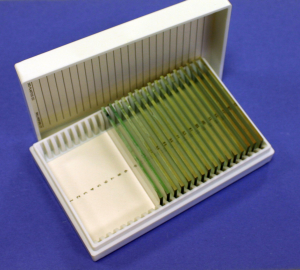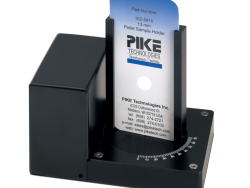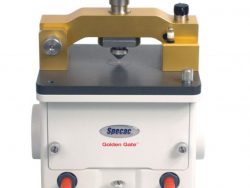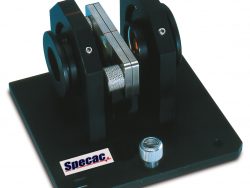Low-e Reflective Microscope Slides
MirrIR low-e microscope slides for reflective infrared studies have no interfering absorption’s from 4000 to 400 cm-1. This powerful sample preparation technique was featured in the June 1997 issue of "Spectroscopy" in the Sampling Solutions section. Infrared microscopy was never easier than with this simple, fast, and cost effective technique for organic and inorganic materials whether liquids or solids. Only microgram quantities are needed which makes it particularly useful for failure analysis and forensic investigations.
MirrIR low-e microscope slides are supplied in a standard 1" X 3" (25mm X 75mm) format. However, other sizes and shapes can be custom fabricated. There are no significant differences from slide to slide, therefore, background spectra are not unique as with other sample preparation methods.
Low vapor pressure liquids can be applied to the low-e surface as a ‘smear’ so that a thickness gradient is created. The spectrum can then be obtained at different sample thickness until the desired spectral intensity is observed.
Solid materials are most easily sampled by starting with small amounts of material and crushing or flattening the material against the low-e surface. This is accomplished with a ‘roller knife’ which is simply a stainless steel roller mounted on a shaft. This technique takes a little practice, but soon gets easy. The portion of the sample being scanned must be in contact with the glass.
MirrIR low-e microscope slides can also be used on a standard IR bench with a specular reflectance accessory. When used in this way only liquids or coated samples can be used and larger samples are required. The original research was done on a bench before an IR microscope was tried.
FAQ
Q: What is the reflective surface made of?
A: The surface consists of several layers, however, the IR reflectance comes from two layers of silver.
Q: How can the IR reflective side be identified?
A: With a little practice you can see that the IR reflective side has a green tint and the non-reflective side a slight violet tint. You can also order slides that have a frosted corner on the reflective side (Product Code CFR).
Q: Can the slides be cleaned with organic solvents?
A: The coating is not affected by common organic solvents. Before shipping the slides are cleaned with hot water and glassware cleaner in an ultrasonic bath.
Q: Can the slides be heated?
A: The slides are stable to 400 degrees C.
Q: Can the glass be cut into special sizes?
A: Generally, any size less than 6 inches by 6 inches can be supplied as well as special shapes. Shapes other than simple rectangles may require water jet cutting which may significantly affect the price.




